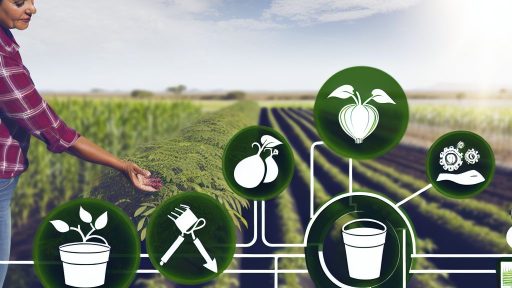Introduction to Trade Policies and Their Role in Agriculture
Trade policies significantly influence agricultural development.
These policies determine how goods move between countries.
They directly affect farmers, producers, and consumers alike.
Trade agreements can create market opportunities for farmers.
Moreover, they can establish regulations for sustainable practices.
In addition, trade policies can enhance food security.
When implemented effectively, they support local agricultural economies.
However, poorly designed policies can lead to negative consequences.
For instance, they might encourage overproduction and environmental degradation.
Thus, understanding these policies is essential for sustainable agriculture.
Types of Trade Policies
Trade policies can take various forms affecting agriculture.
Tariffs are one common type of trade policy.
They are taxes placed on imported goods.
Tariffs can protect local farmers from foreign competition.
Another type is subsidies to support local farmers financially.
Transform Your Agribusiness
Unlock your farm's potential with expert advice tailored to your needs. Get actionable steps that drive real results.
Get StartedThese provide financial assistance to help them compete.
Furthermore, import quotas limit the amount of agricultural products imported.
This can help stabilize domestic markets and prices.
Impact on Sustainable Practices
Trade policies play a critical role in promoting sustainability.
They encourage the use of environmentally friendly farming methods.
For example, certain agreements mandate reduced pesticide usage.
Additionally, they may promote organic farming through incentives.
Trade policies can also facilitate access to sustainable technologies.
This includes newer farming equipment and organic seeds.
Such technologies enhance productivity while minimizing environmental harm.
The Role of International Organizations
International organizations often influence trade policies.
The World Trade Organization (WTO) is a key player in this context.
WTO helps establish fair trading conditions globally.
It also addresses sustainability within trade agreements.
Furthermore, organizations like the United Nations Food and Agriculture Organization promote sustainable practices.
They provide guidelines and support for member countries.
Case Studies of Trade Policy Effects
Examining specific cases offers insights into trade policy impacts.
For instance, the North American Free Trade Agreement (NAFTA) influenced U.S. agriculture.
This agreement opened up markets for various crops.
It benefited certain farmers while displacing others.
Similarly, the European Union’s Common Agricultural Policy affects sustainable agriculture in member countries.
These case studies demonstrate the complex relationship between trade policies and agriculture.
Overview of Sustainable Agriculture Development Goals
Definition and Importance
Sustainable agriculture focuses on meeting current food needs without compromising future generations.
This method promotes agricultural practices that are environmentally sound, socially equitable, and economically viable.
Showcase Your Farming Business
Publish your professional farming services profile on our blog for a one-time fee of $200 and reach a dedicated audience of farmers and agribusiness owners.
Publish Your ProfileIt aims to balance the demands of production with ecological health.
Goals of Sustainable Agriculture
The primary goals include enhancing environmental quality and the resource base.
Moreover, they strive to provide safe and nutritious food for all individuals.
By promoting economic viability for farm operations, sustainable agriculture ensures long-term sustainability.
Additionally, it seeks to improve the quality of life for farmers and society as a whole.
Principles Guiding Sustainable Agriculture
Several principles guide sustainable agriculture development.
These principles focus on conservation and efficient use of resources.
They also promote biodiversity and the health of ecosystems.
- Soil health through organic and regenerative practices.
- Water conservation and management techniques.
- Diversity in crops to enhance resilience.
Global Initiatives and Frameworks
Various global initiatives aim to promote sustainable agriculture.
For example, the United Nations has established Sustainable Development Goals (SDGs).
These goals emphasize sustainable agriculture as a key to eradicating poverty and hunger.
Additionally, frameworks support collaboration among nations for sustainable farming practices.
Challenges to Sustainable Agriculture Development
Despite its significance, sustainable agriculture faces numerous challenges.
One major challenge is the pressure of globalization on local practices.
Another challenge is climate change, which impacts weather patterns and crop yields.
Access to technology and financial resources also poses hurdles for farmers.
Lastly, public awareness and education about sustainable practices need improvement.
How Trade Policies Influence Agricultural Practices Globally
Overview of Trade Policies
Trade policies play a crucial role in shaping agricultural practices worldwide.
These policies determine how countries interact economically.
Furthermore, they affect agricultural exports and imports significantly.
Trade agreements can enhance market access for farmers.
However, they can also expose local markets to global competition.
Impact on Local Agricultural Practices
Policies influence local agricultural practices in diverse ways.
For instance, subsidies can incentivize certain crops over others.
This can lead to monoculture, which harms biodiversity.
In contrast, sustainable practices may receive support through various initiatives.
Consequently, farmers adapt their methods based on these external influences.
Market Access and Opportunities
Trade policies can enhance market opportunities for farmers.
They may reduce tariffs, making exports more competitive.
Access to new markets encourages growth in production.
Additionally, farmers can benefit from technology transfers through trade relations.
Overall, global markets provide pathways for agricultural innovation.
Challenges of Global Competition
However, global competition presents significant challenges.
Local farmers may struggle to compete with large agribusiness companies.
This can lead to decreased market share and income insecurity.
Moreover, fluctuating global prices can adversely impact local markets.
Farmers often face uncertainty due to volatile trade environments.
Environmental Considerations
Trade policies also heavily influence environmental practices in agriculture.
For example, practices may prioritize short-term profits over sustainability.
This can lead to harmful environmental impacts, such as soil degradation.
Showcase Your Farming Business
Publish your professional farming services profile on our blog for a one-time fee of $200 and reach a dedicated audience of farmers and agribusiness owners.
Publish Your ProfileAdditionally, unchecked imports can increase carbon footprints.
Thus, sustainable agricultural development requires careful policy considerations.
The Role of International Cooperation
International cooperation in trade can foster sustainable practices.
Collaborative efforts can lead to the establishment of better standards.
They can create environmentally friendly policies that benefit all parties involved.
Furthermore, partnerships can aid technology transfer and knowledge sharing.
Consequently, cooperative trade relations can bolster sustainable agriculture globally.
Learn More: Farm-To-Table Policies and Their Role in Sustainable Agricultural Practices
Case Studies: Trade Policies and Their Impact on Sustainable Agriculture in Different Countries
United States: Subsidies and Environmental Regulations
The United States implements various subsidies to support its agricultural sector.
These subsidies often encourage practices that harm ecosystem health.
For instance, the focus on monoculture reduces biodiversity significantly.
Additionally, environmental regulations aim to mitigate negative impacts.
However, enforcement and adherence to these regulations vary widely.
Farmers like Emily Thompson advocate for sustainable practices.
They emphasize the need for balancing productivity with environmental protection.
European Union: The Common Agricultural Policy
The European Union’s Common Agricultural Policy promotes sustainable agriculture.
This policy offers financial support for eco-friendly farming practices.
Countries like France have seen enhanced organic farming due to this initiative.
Furthermore, the policy emphasizes reducing greenhouse gas emissions.
Farmers, such as Marc Dupont, have adopted crop rotation techniques.
These methods improve soil health and increase nutrient cycling.
India: Liberalization and Its Challenges
India’s trade policies have evolved since the liberalization in the 1990s.
These changes aimed to integrate India into the global market.
However, they have led to challenges for small-scale farmers.
The reliance on chemical fertilizers has escalated environmental degradation.
Activists like Priya Sharma promote organic farming solutions.
They advocate for policies favoring sustainable agricultural practices.
Brazil: Trade Agreements and Deforestation
Brazil’s trade agreements significantly influence its agricultural practices.
Large-scale soybean production has driven deforestation in the Amazon.
Consequently, these practices threaten local biodiversity and indigenous communities.
Organizations like the Amazon Environmental Alliance work to combat these issues.
They advocate for sustainable land-use policies that protect forests.
China: Balancing Growth and Sustainability
China has made strides in sustainable agriculture amid rapid growth.
Trade policies encourage the use of modern technologies and practices.
For example, precision farming has gained popularity among Chinese farmers.
Experts like Dr. Li Wei promote sustainable techniques to enhance yields.
These efforts aim to ensure food security while protecting the environment.
Each country illustrates unique interactions between trade policies and sustainable agriculture.
Understanding these case studies fosters insights into potential improvements.
Trade policies can ultimately support or hinder sustainable agricultural practices.
Showcase Your Farming Business
Publish your professional farming services profile on our blog for a one-time fee of $200 and reach a dedicated audience of farmers and agribusiness owners.
Publish Your ProfileBy evaluating various approaches, nations can cultivate better strategies.
Delve into the Subject: Navigating Farm-To-Table Laws: Essential Insights for Agricultural Producers
The Economic Implications of Trade Policies on Farmers and Sustainability
Overview of Trade Policies
Trade policies significantly influence agricultural markets worldwide.
These policies can either promote or hinder sustainable farming practices.
For instance, tariffs can impact farmers’ access to necessary resources.
Conversely, free trade agreements may boost market access for exports.
Impact on Farmers’ Incomes
Changes in trade policies directly affect farmers’ earnings.
Higher tariffs can reduce profit margins for export-oriented producers.
In contrast, lower tariffs usually benefit farmers by increasing demand.
Furthermore, access to international markets may diversify income sources.
Access to Sustainable Practices
Trade policies can shape farmers’ access to sustainable agricultural methods.
Supportive policies encourage the adoption of eco-friendly technologies.
Conversely, restrictive measures may limit the availability of sustainable imports.
This imbalance can hinder the overall sustainability of agriculture.
Market Stability and Competitiveness
Stable markets rely on effective trade policies to function well.
Unpredictable policies can lead to market volatility, affecting all stakeholders.
A predictable trade environment fosters long-term planning for farmers.
Moreover, it allows for increased investment in sustainable practices.
Influence on Consumer Preferences
Trade policies also impact consumer behavior regarding sustainable products.
Policies that promote organic imports can shift demand toward sustainable options.
As a result, farmers may adapt their practices to satisfy consumer preferences.
This shift aids in the advancement of sustainable agricultural development.
Global Cooperation and Local Benefits
Effective trade policies require global cooperation for mutual benefits.
Such cooperation enhances the sharing of sustainable practices across borders.
Ultimately, this can lead to improved agricultural productivity worldwide.
Local farmers benefit when they can implement successful international models.
Challenges Ahead
Despite the positive aspects, challenges persist in aligning trade policies with sustainability.
Political decisions often prioritize short-term gains over long-term sustainability.
Additionally, not all farmers possess equal resources to adapt to policy changes.
This disparity can widen the gap between sustainable and conventional farming.
See Related Content: Ensuring Compliance with Animal Welfare Laws in Agriculture

Trade Barriers and Their Effects on Sustainable Agriculture Products
Understanding Trade Barriers
Trade barriers include tariffs, quotas, and import restrictions.
These barriers hinder international trade for agricultural products.
Consequently, they create challenges for sustainable agriculture.
Farmers face difficulties accessing global markets.
Impact on Sustainable Agriculture
Trade barriers increase costs for producers and consumers.
Higher costs reduce the competitive edge of sustainable products.
This situation discourages investment in sustainable farming methods.
Moreover, local farmers may struggle to compete with subsidized imports.
Market Access Challenges
Limited market access constrains the growth of sustainable agriculture.
Showcase Your Farming Business
Publish your professional farming services profile on our blog for a one-time fee of $200 and reach a dedicated audience of farmers and agribusiness owners.
Publish Your ProfileProducers cannot capitalize on favorable market conditions.
As a result, many struggle with lower sales and revenues.
This creates obstacles to scaling sustainable practices effectively.
Quality and Standards Issues
Trade barriers can complicate compliance with international standards.
Producers may face various regulations that differ across borders.
These complexities can undermine the quality of sustainable products.
Consequently, consumers may be less likely to choose them.
Environmental Consequences
Trade restrictions sometimes lead to unintended environmental impacts.
Increased transportation carbon emissions occur due to inefficient sourcing.
Moreover, local ecosystems may suffer from non-sustainable practices.
Such effects contradict the goals of sustainable agriculture.
Opportunities for Improvement
Countries can work together to reduce trade barriers.
Collaborative policies promote fair trade in sustainable products.
Moreover, governments can support local producers through subsidies.
Such measures encourage sustainable practices and responsible consumption.
Discover More: Renewable Energy Subsidies: A Farmer’s Comprehensive Guide
The Role of International Trade Agreements in Promoting Sustainable Agricultural Practices
Understanding Trade Agreements
Trade agreements shape global agricultural policies profoundly.
They establish rules that govern international trade between countries.
These agreements can promote sustainable agricultural practices effectively.
Encouraging Sustainable Practices
Many trade agreements include provisions for environmental protection.
These provisions incentivize farmers to adopt eco-friendly practices.
For example, the Comprehensive and Progressive Agreement for Trans-Pacific Partnership emphasizes sustainability.
It encourages members to integrate sustainable practices in their agricultural sectors.
Case Studies of Successful Implementation
The European Union’s Common Agricultural Policy exemplifies positive outcomes.
This policy prioritizes sustainable farming through direct payments for eco-friendly practices.
Countries like Brazil also demonstrate success through sustainable forestry agreements.
These agreements have led to reduced deforestation rates while promoting agricultural growth.
Challenges and Opportunities
While trade agreements have benefits, challenges persist.
Countries often face difficulties in aligning national regulations with international standards.
Additionally, there can be conflicts between trade liberalization and local sustainability efforts.
Nevertheless, these challenges present opportunities for innovation in agricultural practices.
Future Directions
Further strengthening of trade agreements is essential for sustainable agriculture.
Introducing clearer guidelines on sustainable practices can enhance effectiveness.
Collaboration between nations is crucial for achieving common goals.
Only through concerted efforts can sustainable agriculture thrive globally.
Future Trends: Aligning Trade Policies with Sustainable Agriculture Development
Emerging Trade Agreements
New trade agreements increasingly prioritize sustainable agriculture practices.
These agreements aim to enhance food security and environmental protection.
For instance, countries are negotiating terms that limit the use of harmful pesticides.
Integration of Sustainability Standards
Sustainability standards are becoming essential in international trade policies.
Many countries adopt measures to ensure trade does not harm the environment.
Showcase Your Farming Business
Publish your professional farming services profile on our blog for a one-time fee of $200 and reach a dedicated audience of farmers and agribusiness owners.
Publish Your ProfileThese standards include guidelines for organic farming and fair trade practices.
Technological Advancements in Agriculture
Technological innovation significantly influences sustainable agricultural practices.
Agroecological approaches utilize advanced techniques to improve yield.
Moreover, precision farming minimizes waste and enhances resource efficiency.
Public-Private Partnerships
Collaborations between governments and private sectors are gaining traction.
Such partnerships develop initiatives that promote sustainable agriculture.
They also help invest in research and technologies that support sustainable practices.
Consumer Awareness and Demand
Consumer preferences drive the shift towards sustainable agriculture.
Many consumers are now prioritizing eco-friendly and ethically sourced products.
This trend encourages businesses to adopt sustainable practices to meet demand.
Climate Change Considerations
Trade policies increasingly reflect the urgency of addressing climate change.
Countries recognize the need to adapt agriculture to climate impacts.
This adaptation includes promoting crops resilient to extreme weather conditions.
Funding and Resource Allocation
Investments in sustainable agriculture are essential for future growth.
Trade policies often include funding mechanisms for sustainable initiatives.
These resources support farmers transitioning to sustainable practices.




